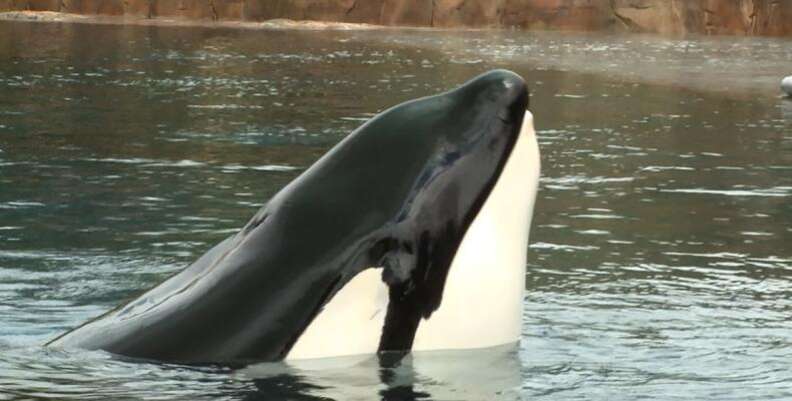SeaWorld’s Most Famous Whale Is Dying
SeaWorld's most famous orca Tilikum is ailing, the marine park said on Tuesday.
"We are saddened to report that over the past few weeks, Tilikum's behavior has become increasingly lethargic, and the SeaWorld veterinary and animal care teams are concerned that his health is beginning to deteriorate," the company said in a statement.
SeaWorld said that Tilikum has been treated for a possible bacterial infection in his lungs. "The suspected bacteria is very resistant to treatment and a cure for his illness has not been found," SeaWorld said.
Tilikum's story, which was largely profiled in the 2013 film "Blackfish," has become something of a rallying cry for people concerned about SeaWorld's alleged mistreatment of its animals. The roughly 35-year-old whale was captured from his wild family in 1983, when he was just 2 years old, and has lived at SeaWorld for the past 23 years.
During his time in captivity, Tilikum has been involved in three high-profile human deaths. In 1991, while still the property of Sealand, a now-defunct marine park in Canada, Tilikum was one of three whales who drowned trainer Keltie Byrne after she fell into their pool.
Sealand closed down shortly after and sold Tilikum to SeaWorld. In 1999, a homeless man named Daniel P. Dukes secretly stayed overnight at SeaWorld Orlando. He was found dead the next morning, draped over the back of Tilikum.
In 2010, Tilikum was responsible for the death of SeaWorld trainer Dawn Brancheau. Brancheau was leaning down near Tilikum when he grabbed her and pulled her into the water and began to play with her body until she died.
After Brancheau's death, Tilikum and his grandson, Trua, were largely isolated from the other whales at the park - a painful arrangement for the social animals.
There has never been a recorded case of a wild orca killing a human, despite often coming within close proximity of each other, and welfare advocates have pointed to Tilikum's aggression as a sign of the stress and confusion of keeping whales in captivity.
Tilikum has also exhibited other signs of captive stress. He's been spotted floating motionless for hours on end - an unnatural behavior for orcas, who are constantly moving in the wild - and has broken off his teeth from chewing on the sides of his tank out of frustration.
Infections, like the one Tilikum is reportedly suffering from, are also more common in captive orcas than wild ones due to the stress of captivity and poor water quality.
But SeaWorld's kept a tight hold on Tilikum, who's at the center of their artificial insemination program; he's fathered 21 of SeaWorld's captive-born calves, only half of whom are still alive.
Hopefully Tilikum will pull through - but it's doubtful SeaWorld would have released this information if a recovery were in sight.
Tilikum's illness is just the latest in a streak of bad news when it comes to SeaWorld's animal health. Five marine mammals have died at the parks since last summer, including Unna, Tilikum's daughter, who passed away at just 18 from a reported fungal infection.
